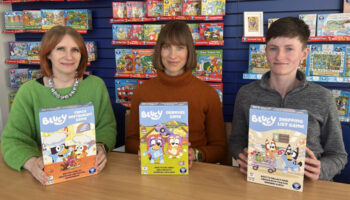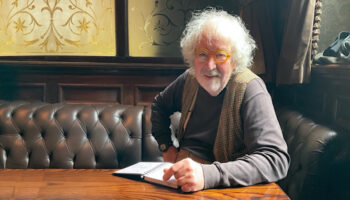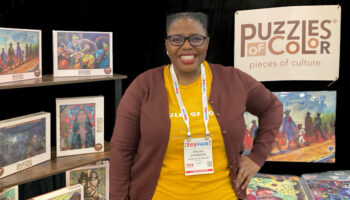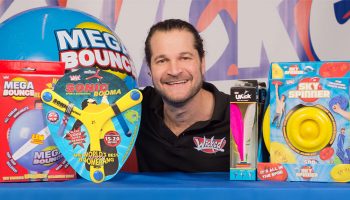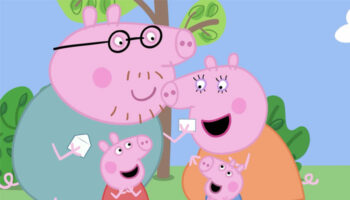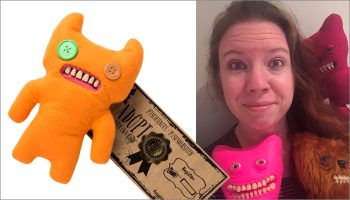Gavin Ucko on why new inventors are always welcome at The Happy Puzzle Company

Gavin Ucko, you’re the owner of The Happy Puzzle Company. Which toys and games did you play with growing up?
To be honest, nothing could ever surpass my love of all things Monopoly… It’s always been an obsession of mine. That aside, as a family we always played games when I was growing up and my parents still do every day, even in an empty nest! Every evening we would play Rummikub or Boggle or any number of word games!
A family with classics on the go; good answers! I’m presuming you enjoy puzzles… Has that always been the case?
I am completely, totally and utterly puzzles and games obsessed! It’s in my blood and I’m fascinated by all things puzzling. I want to learn, understand, develop – and I always have. I was very fortunate because my school always gave me a platform to try out my crazy puzzle and game inventions to a willing audience!

So it was a very early interest? How did you come to be in the toy industry, then?
In one sense, it was logically the only thing that I was ever going to do. However, my route into it was via education. By profession, I’m actually a psychologist of education and I spent many happy years as head of informal education at one of London’s largest secondary schools.
Ah! I imagine that’s hugely informative…
Absolutely. Over time, I started to realise how toys and games could help to develop an enormous range of skills and build self-confidence. I felt I could make a difference in the toy industry and really, things have fallen into place over a long period of time… I have found my niche!
Brilliant. That niche now includes a range of over 300 challenges, games, puzzles and puzzle books. What is it you look for in a product?
I look for something which is different! It either needs to offer something which has never been done before, or something which has been done before, but in a completely new way. There are so many good ideas out there and there’s no need to reinvent the wheel… That said, we pride ourselves on selling things that people are unlikely to have seen before.

Well, to that end… I know some of your ranges are external inventor items. But how do you find ideas in such a niche area?
We seem to have developed into a hub for inventors who are bringing a game to market for the first time. In many cases, they’ll have approached large numbers of big games companies and made no progress at all. We’re constantly on the lookout for ideas that will give new inventors their first opportunity, though.
Once we got that reputation, people started coming to us knowing that we’ll listen to them. I never, ever turn away an idea without considering it seriously. I also have a responsibility to go back to the inventor and explain to them why I’ve reached a decision.
And if it isn’t good news?
If it isn’t good news, I help them to either change their idea positively or find the right company for them to work with. For somebody who presents you their game, generally it’s something into which they’ve poured their heart and soul. That needs to be respected.

You’re preaching to the converted! In your case specifically, then, is there a right way or a wrong way to pitch ideas to you?
I think it’s actually the other way round. We need to demonstrate to the inventor that we’ll look after their idea, and respect and nurture what they’ve created. It’s vital we allow the inventor to be part of the creative process and involve them as much as possible.
Brilliant. There are people reading this, though, wondering when the other shoe will fall! Is there a downside to this?
Well, with all that said, I do find it very difficult to work with people who have little or no experience in the toy industry, but who think they know everything. You’re bringing us an idea because you want us to develop it. You have to allow us the space and time to do that, and demonstrate that you’re willing to trust us. If the trust isn’t there and if the inventor wants to dictate everything that we do, then to be honest with you, the relationship is doomed before it starts!
Great answer. On a similar point, what makes a product easier for you to sell to your customers?
It’s always easier to sell an item when you can look at the box and immediately understand what the puzzle or game involves. The more you have to study the box, the less chance there is that people will engage with the product. Time is everything… You need to sell the game in that split second when you have the customer’s attention. If you can’t do that with a game, you’re always going to be running uphill.

By way of example, perhaps, one of your lines is the award-winning Genius Square… Which I absolutely love, by the way! That’s a set of two puzzles but your race to solve them as a game… So I’m curious: do games sell better than puzzles for you?
That is a fascinating question because as far as I’m concerned, The Genius Square is a series of 62,208 puzzles. It’s just a puzzle which you solve competitively if you want to. There’s a clear Venn diagram going on here! There are puzzles which are obviously puzzles and there are games which are obviously games – and then there’s the crossover in the middle. I think that is our area!
Oh, I love that… That’s absolutely clear.
To further answer the question, we sell things which puzzle lovers and game lovers will love. I think a high proportion of people who buy things from us fall into both of those categories.
And – this might be a bit in the weeds but you’ve got me thinking… At what point does a puzzle become a game?!
We’re back at the Venn diagram again! Clearly a jigsaw is a puzzle, a WORDsearch is a puzzle, and a crossword is a puzzle. A Rubik’s cube is a puzzle. Monopoly, Game of Life, Twister and so on… They’re games… Scrabble, Boggle, Mastermind, The Genius Square… They’re all puzzle games that sit in the crossover.

Going back to something you said earlier, I know – pre-pandemic – you were still active in education, running, as I understand it, Puzzle Challenge Days for schools. Tell us about those…
Yes. So as I say, my route into what I do was through education. We’ve now run our puzzle challenge days in over 8,000 schools in the UK. The purpose of those programs is to use puzzles and challenges to help develop a whole variety of thinking skills, logical reasoning – and to build resilience in the students. The program is set up in a way so that you can’t fail at what you’re doing… And what the students achieve is mind blowing.
From the teacher’s point view, it gives them a rare opportunity to take a step back and watch their students in action. It’s remarkable what they learn about the students, because you might have a student who excels in the classroom academically, but simply cannot work as part of a team. Similarly, you might have a student who really struggles in the classroom, but in this scenario, displays the most amazing leadership skills. It’s fun, it’s eye-opening and it’s life changing and we are incredibly proud of what we do!

Sounds incredible! If you’re happy to do it, Gavin, I’d love to reach out to the inventor of The Genius Square for a chat about the development of that game. For now, though, let me ask you this: what’s the most interesting thing in your office or on your desk?
I have a very big desk and I always keep a 1,000 piece jigsaw on the go. One of the things I’ve learnt during lockdown is that if I’m in a Zoom meeting which is particularly boring, I can angle the camera so that I can be doing the jigsaw without anybody else realising. It’s a skill which has taken some perfection!
Good LORD! I’m glad you didn’t tell me that at the start; I’d’ve been so self-conscious! Gavin, thank you for your time; a genuine pleasure.

—
To stay in the loop with the latest news, interviews and features from the world of toy and game design, sign up to our weekly newsletter here





